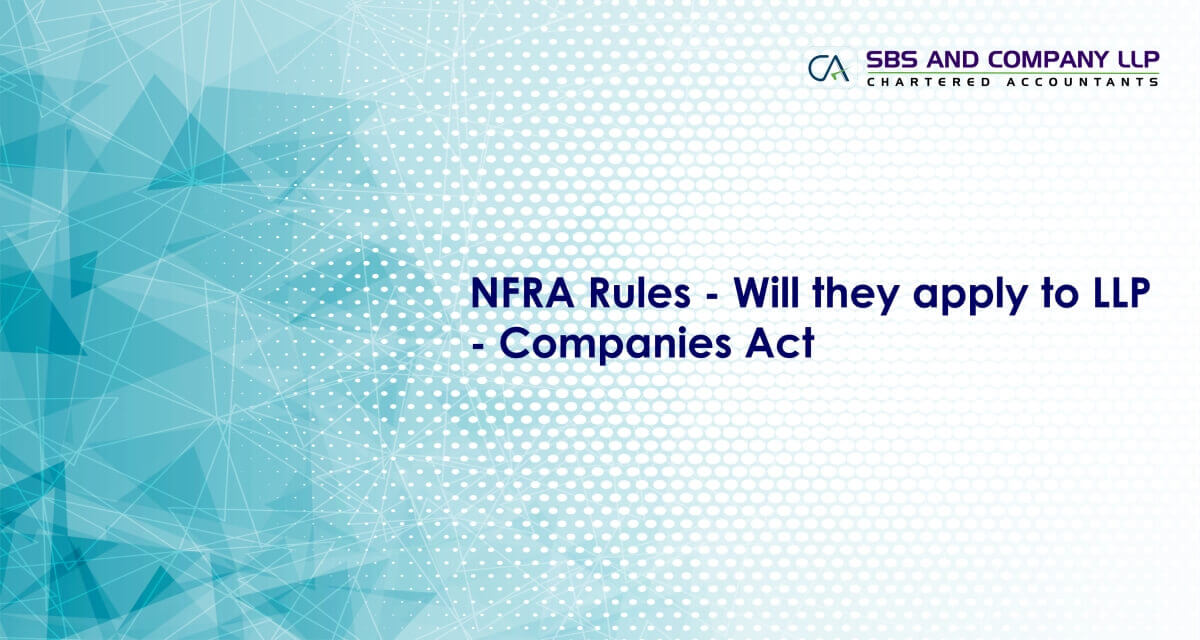This article is an attempt to list out the provisions/compliances by the applicable entities, in respect of the provisions of National Financial Reporting Authority, constituted under provisions of Section 132 of the Companies Act, 2013.
A specific thrust is put-in to see as to which type of entities, will come under the scope “Bodies Corporate (Other than Companies)”.
The National Financial Reporting Authority [NFRA], was constituted with effect from 01.10.2018, and working provisions, functions, have been notified vide NFRA Rules, Dt: 13.11.2018.
Need of NFRA:
- Increase in financial scams in the recent past;
- Increase in non-performing assets (NPA) with Banks and other Financial institutions;
- To have a strong regulator to oversee the process of Financial Reporting; and frame required regulations and compliance mechanism, to see proper implementation of the Financial Reporting.
Objectives/Powers of NFRA:
- Recommending Accounting Standards and Auditing Standards;
- Monitoring and enforcing Compliance with accounting standards and auditing standards;
- Oversee the quality of Service and Suggesting measures for improvement;
- Financial Reporting Advocacy and Education;
- Power to Investigate and initiate Disciplinary proceedings.
Applicability of provisions of NFRA:
The NFRA shall have power to monitor and enforce compliance with accounting standards, auditing standards, oversee the quality of service and undertake investigation of the auditors of the following class of companies and bodies corporate, namely:-
- Companies whose securities are listed on any stock exchange in India or outside lndia;
- Unlisted Public Companies having:
- Paid up Capital is Rs. 500 Crores or more; or
- Turnover is Rs. 1000 Crores or more; or
- Aggregate of Outstanding Loans, Debentures and Deposit is Rs. 500 Crores or more in immediately preceding Financial Year.
- Insurance companies, Banking companies, Companies engaged in the generation of supply of electricity, Companies governed by any Special Act, for the time being in force or Bodies Corporate
- Any body corporate or company or person, or any class of bodies corporate or companies or persons, on a reference made to the Authority by the Central Government in public interest;
- A Body Corporate incorporated or registered outside india, which is a subsidiary or associate company of any Company or Body Corporate incorporated or registered in India as referred to above, if the net worth of such subsidiary or associate company exceeds 20 % of the consolidated income or consolidated net worth of such company or the body corporate, as the case may be referred to above.
- Any Company, Body governed under the NFRA Rules, shall continue to be governed by the Authority for a period of 3 years, after it ceases to fall under the threshold limits, mentioned above
Filing of Form NFRA-1:
Every existing Body Corporate (other than a Company) governed by these rules, shall file NFRA-1, informing the details of Auditors, within a period of 30 days from the commencement of the rules.
Every Body Corporate, other than a Company, as defined in Clause 2(20), formed in India and governed under the rules, shall within 15 days of appointment of Auditor, file Form NFRA-1, informing the details of Auditors.
Companies, which come under the purview of the NFRA rules are not required to file NFRA-1, as they have already filed form ADT-1, informing the details of the Auditors.
Filing of Annual Return by the Auditor concerned:
Every Auditor in respect of the entities covered under Rule-3 of the NFRA rules, shall file a return with the NFRA on or before 30th April every year in such form as may be specified by the Central Government.
Now the question come as to who are covered under the “Body Corporate” or “Bodies Corporate”, for the purpose of coverage under the NFRA Rules.
In general parlance, “Body corporate” broadly means a corporate entity which has a legal existence.
|
The Companies Act, 2013, defines Body Corporate as below:
(11) "Body corporate" or "Corporation" includes a company incorporated outside India, but does not include:
(i) A Co-operative Society registered under any law relating to Co-operative Societies; and
(ii) any other body corporate (not being a company as defined in this Act), which the Central Government may, by notification, specify in this behalf;
(20) "Company" means a company incorporated under this Act or under any previous company law;
|
From the above, it can be seen that the definition is an inclusive definition, excluding the following i.e., A Co-operative Society; and any other body corporate (not being a Company as defined in this Act.
However, to the best of knowledge of the author, there is no notification from the Central Government, excluding any Body Corporate, falling under the purview of the definition of Body Corporate under the Companies Act, 2013.
In view of the above, the Author, on a plain reading of the NFRA rules, read with the definition of Body Corporate under the Companies, Act, is of the view/opinion that LIMITED LIABILITY PARTNERSHIPS (LLPs), will strictly fall under the scope of Bodies Corporate, and accordingly, the applicability of the provisions of NFRA rules to LLPs.
Since the relevant NFRA-1, forms are not yet made available, the Ministry has to come-up with clarifications as to the applicability of Rules with reference to Body Corporates, to clear the persisting ambiguity.



